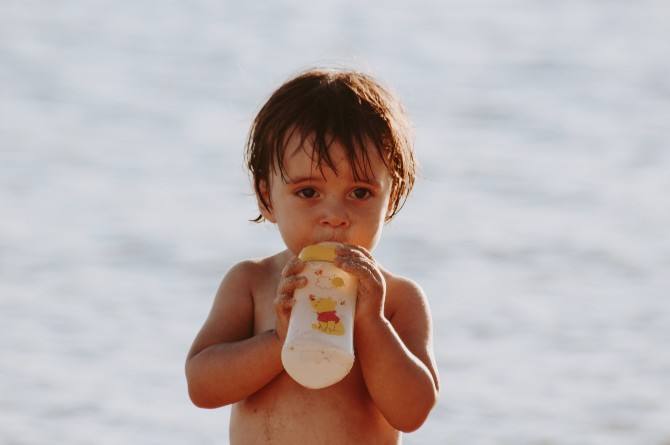Most tetra-packed milk products undergo heat treatment, which is a widely used processing technology in the milk industry. The pasteurization of milk through temperature and time helps destroy microorganisms. It ensures that the milk is safe for consumption and has a reasonable shelf-life.
What can you read in this article?
- Pasteurization of milk-based on temperature and time linked with increased chances of asthma in children
- The average age of Atopic Asthma diagnosis: 3 Years
- Signs of Asthma in children
However, the consumption of heat-treated milk products may be increasing the risk of asthma in babies. At least that’s what a new research study says published by Pediatric Allergy and Immunology.
This is concerning with respect to formula milk given to newborns that could trigger asthma. On the other hand, the study found breastfeeding to reduce the risk of nonatopic asthma.
Pasteurization of milk-based on temperature and time linked with increased chances of asthma in children

Image Source: Pexels
Researchers at the University of Helsinki in Finland came to this conclusion over the course of their study. The researchers analyzed 3,053 children born between September 1996 and September 2004.
They took three-day food samples from the participants at specific intervals, namely at three and six months of age. Researchers took samples again when the children turned a year old up to five years.
Researchers then analyzed the samples taken and took note of all milk products that the children consumed. The study used a joint model for longitudinal and time-to-event data.
This helped researchers analyze the association between the risk for asthma (atopic and nonatopic asthma) and the different milk products that children consumed.
The results concluded with about 184 participants or six percent of the total children had asthma by their fifth birthday. The data also showed that 54 percent of the cases were atopic asthma, while 40 percent were nonatopic asthma. About four percent of the asthma diagnoses couldn’t be classified.
READ MORE:
STUDY: Babies, toddlers who take antibiotics may develop into asthma and allergies later on
Hika ng bata: Sanhi, sintomas, at gamot para sa sakit na asthma
TAP Picks: Best nebulizers for babies in the Philippines for asthma relief
The average age of Atopic Asthma diagnosis: 3 Years
The study concluded that the average age of atopic asthma diagnosis was three years for atopic children. Meanwhile, it stood at two years for nonatopic children.
Essentially, an allergy, dust, or pollen can trigger atopic asthma. It does not happen to kids with non-atopic asthma.
Researchers concluded that children diagnosed with asthma were more likely to consume heat-treated or milk-based infant formulas. The risk factor also stayed higher in the children who consumed cow’ milk products as well as nonfermented milk products, the study concluded.
In contrast, plant-based milk alternatives showed a lower risk of asthma in the study. Researchers found soy-based formulas to be safe.
In the study’s hypothesis, researchers said that the heat-treatment of milk products specifically raised the risk of an asthma diagnosis.
However, there needs to be more research in this field to confirm these findings and understand what are the contributing factors in the heat process that increase the risk.
However, families should consult with their child’s doctor about what formula is right for their infant before making a switch.
Signs of Asthma in children

Image Source: Pexels
Children can be diagnosed with asthma at any age. And many children will show signs even before the age of five years.
A child may have different signs of asthma, that’s why parents will need to observe a pattern more closely and then approach a doctor.
Here are some signs of asthma in children to watch out for:
- Regular cough
- A cough that turns into viral infection
- Kids frequently avoid sports or social activities
- Rapid breathing
- Chest tightness
- Wheezing
- Frequent shortness of breath
- Grunting while eating (in infants)
If you see your child struggling from any of these conditions frequently, make sure to arrange for an appointment with your pediatrician. With a little effort and precaution, asthma can be controlled in children.
Your doctor will prescribe either quick-relief medications, which is usually the case with children under the age of four years. In other cases, the doctor may prescribe a spacer that will offer immediate relief.
Source:
 Money Tips
Money Tips Building a BakuNation
Building a BakuNation Becoming a Parent
Becoming a Parent Ages & Stages
Ages & Stages Parenting
Parenting Health & Wellness
Health & Wellness Education
Education Lifestyle Section
Lifestyle Section Become a VIP
Become a VIP Press Room
Press Room TAP Recommends
TAP Recommends Shopping
Shopping Community
Community Rewards
Rewards VIP Parents
VIP Parents
